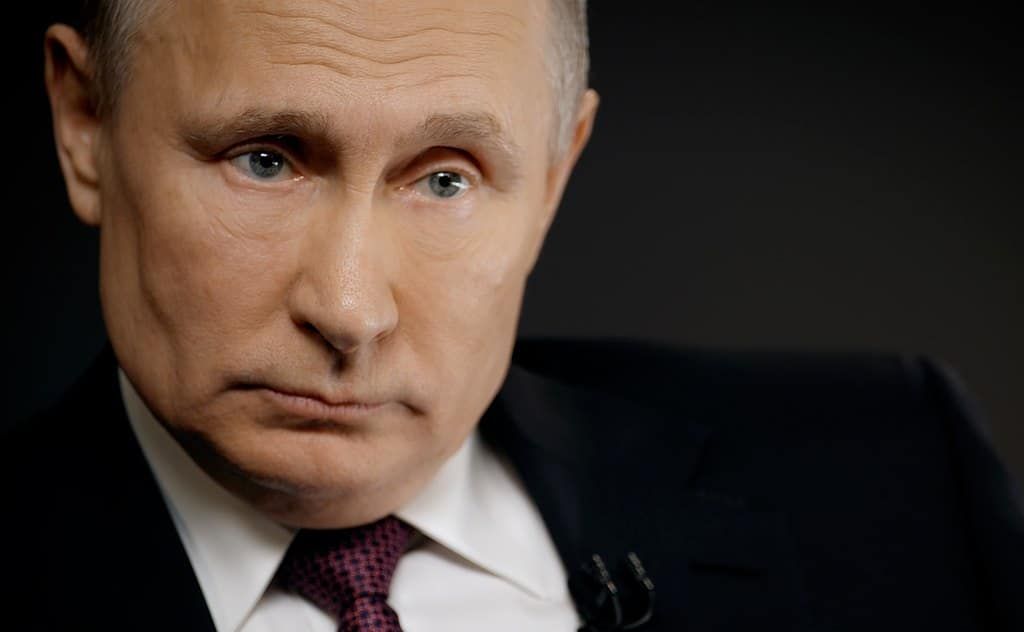What’s eating Putin?
By Rose Gottemoeller | March 3, 2022
 Russian President Vladimir Putin. Credit: TASS News Agency. Accessed via Wikimedia Commons. CC BY 4.0.
Russian President Vladimir Putin. Credit: TASS News Agency. Accessed via Wikimedia Commons. CC BY 4.0.
As horrific and needless violence unfolds in Ukraine, my friends, family, colleagues, and media from around the world have all been asking the same questions: What’s eating Putin? What has driven him to start the largest war in Europe since World War II? What is driving him to threaten World War III, including the use of nuclear weapons?
My answer has been: It’s complicated. No single answer fully accounts for the display we are seeing of Vladimir Putin’s anger and grievance. Many Russian experts who know Putin well have been commenting on his mindset, but I want to lay out how I think about the picture. As I see it, at least eight different factors account for Putin’s erratic and dangerous behavior:
Genuine nostalgia. Putin has done a lot to stir up nostalgia for Russia’s imperial past and the nationalist trappings that go with it—Russian Orthodoxy, protection of Russian-language speakers, and conservative interpretations of Russian national identity. His 6,000-word treatise last summer on Moscow’s undying links to “Staraya Rus’”—now inconveniently located in independent Ukraine—is his clearest articulation of this nostalgia. He conveys the notion that Russians and Ukrainians are one people, ignoring opinion to the contrary.
Righting past wrongs. Putin has famously said that the demise of the Soviet Union is the greatest tragedy of the 20th century. He holds in contempt Gorbachev and Yeltsin, two Russian leaders who let the Soviet republics go to seek whatever measure of independence and sovereignty they could achieve. The Crimean invasion in 2014 was one of his earliest efforts to right past wrongs. In 1997, a treaty between Russia and Ukraine established that the borders of Ukraine would be those of the former Soviet Republic of Ukraine, which included Crimea. Putin reportedly argued fiercely against this outcome at the time, and so his 2014 invasion of Crimea can be seen as his first step in righting past wrongs.
A different reality. Putin is surrounded by a fortress-like inner circle that has long jealously guarded what information gets to the boss. Its members are allergic to wider viewpoints breaching the wall and Putin likes it that way. He no doubt genuinely believes at this point that NATO promised not to expand to the east, although his intimate experience with NATO should lead him to know otherwise. In 2002, Putin signed the Rome Declaration, which led to over a decade of pragmatic cooperation benefitting both NATO and Russia. By that time, NATO was already through its first waves of expansion to former Warsaw Pact countries and the Baltic States. This history seems to have been wiped from Putin’s memory.
Scorn for Ukraine’s leadership and system. Ukraine has evolved into a messy but vibrant democracy that Putin cannot understand. Its leader is a comic, its electoral system uncontrollable, its government, including security services, reforming in directions inexplicable to him—except they are taking Ukraine farther and farther from Russia’s orbit. The Ukrainians do not jump any more when Putin says so.
The global bully. In 2007, Putin brought his black Lab Koni into a meeting with Angela Merkel, because he knew she was deathly afraid of dogs. She was indeed frightened, visibly so, and he thus solidified his reputation as a bully. As Merkel commented at the time, “I understand why he has to do this—to prove he’s a man…He’s afraid of his own weakness.” That sounds like the classic definition of a bully. Now he’s playing the global bully, frightening the world with the Russian army and fierce threats of war. It is what he knows how to do best, and it pays off for him.
“Look at Me.” China has been astride the world stage, throwing its wealth around, building up its military, broadcasting that it owns the 21st century. This behavior has alarmed the 20th century superpower, the United States, which has duly pivoted to Asia. Prior to the current crisis, President Biden and his administration barely mentioned the word “Russia” in their talk about their foreign policy priorities. Putin does not like disappearing from sight and so has done what he can do—brandish his military might, insisting that the world “look at me.”
Domestic bargaining. Putin is 70 years old this year. He has reached the late stage of autocracy, when he constantly has to balance and bargain among powerbrokers who need him to sustain their own power but are jockeying already to succeed him. He also has a public steadily less trustful of his government. He has to keep everybody off balance, and claiming an existential external threat is a time-honored way to do so.
Real frustration. When Putin was first briefed on the nature of the Conventional Armed Forces in Europe Treaty (CFE), he reportedly got angry that the limitations in the treaty meant that he could not move his own forces around on Russian territory. The “flank limits” were designed to keep Russia from concentrating its forces close to the borders of NATO countries, against Norway or Turkey, for example. These NATO countries were also prevented from concentrating forces against Russia, but that did not stop Putin’s anger, which led Russia to declare in 2007 that it would no longer abide by CFE. In the current crisis, he has frequently said that he must have the right to move his own forces around on Russian territory.
What’s eating Putin is therefore a dangerous brew: part personal grievance, part bullying behavior, part scorn for his adversaries, and part dictates for staying on top in the Russian system. Given his grave isolation, a part may also be his sense of genuine threat. Trying to back him off this precipice will take a good deal of finesse. No foreign counterpart has found the means thus far to tempt him off the cliff, although many have tried. President Macron of France is still trying. Perhaps now that China has taken an interest in facilitating diplomacy between Ukraine and Russia, President Xi Jinping will be the hero of the tale. That would be interesting.
Together, we make the world safer.
The Bulletin elevates expert voices above the noise. But as an independent nonprofit organization, our operations depend on the support of readers like you. Help us continue to deliver quality journalism that holds leaders accountable. Your support of our work at any level is important. In return, we promise our coverage will be understandable, influential, vigilant, solution-oriented, and fair-minded. Together we can make a difference.
Keywords: Putin, Russia, Ukraine, nuclear risk, nuclear weapons, war
Topics: Nuclear Risk, Nuclear Weapons















Sadly his nostalgic needs to rebuild an empire are failing. With the breakup of the former USSR, those countries that were in the former ‘Eastern Bloc’ want their freedom more than they want him. Something he cannot face. Russia’s population is shrinking, the world is looking to alternative energy sources, which could be a big problem if all your plans to become a petro economy. His tactics are similar to those used by the Germans back in the 1930’s – ‘Oh look I am repatriation of Russians, the fact I have to take over a resource rich country…..’ Having lived… Read more »
Excellent analysis… will he go nuclear and what would NATO do??
Nice article. John von Neumann originally came up with MAD for the defense of the United States. He was the pentagon and presidents go to consultant and all around polymath. But of course that assumes the sanity of both sides. I will stop there.
We are at the precipice of nuclear war. Oppenheimer was right when he saw the first nuclear explosion, “I am death. The destroyer of worlds.” Humanity is doomed, unless the Russian people remove Putin from power. If we capitulate, we become slaves. If we resist, we will all die. No rational person would pose that choice to the world, but that is what Putin has done. He must be removed from power as soon as possible.
All right, someone be real with me: has The Bulletin been captured by the US national security state? Is that what’s happened here? For the last few years now I have seen a torrent of articles from here demonizing Russia and China as the Great Others and this article is no exception. Extremely shallow personification-driven analyses like this, totally devoid of the Western role in pushing the world closer to nuclear armageddon, quite frankly signals to me that the Bulletin is no longer serious about opposing nuclear armageddon.
A few years ago, Tom Engelhardt of the TomDispatch website wrote a very interesting analysis of what would likely happen if the US attacked Iran, using the Suez Crisis as an example of how a declining Great Power could slip even further down the international pecking order with stupid actions like that. I’m coming to see this as Russia’s Suez Crisis moment.